Pic story: inheritor of Huizhou bamboo carving in China's Anhui
新華網(wǎng)
Editor: huaxia
2025-01-17 20:20:41

Hong Jianhua (2nd, R) guides a craftsman to carve bamboo art work at Huizhou Sculpture Museum in Huizhou District of Huangshan City, east China's Anhui Province, Jan. 7, 2025. Hong Jianhua, an inheritor of Huizhou bamboo carving listed in China's national intangible cultural heritages, has been dedicated to the craft since the age of 16. The art has received a new lease on life thanks to the efforts made by Hong to innovate technical methods, especially in high relief. To better pass on the craft, Hong launched a studio and a museum to make the beauty of this ancient Chinese art widely known among the public.
The skills of bamboo carving, brick carving, wood carving and stone carving are the top four traditional carving arts in Huizhou. Taking the phyllostachys edulis, which is abundant in Huizhou area, as the raw material, bamboo carvers use knives to carve historical allusions, landscapes and other patterns on the phyllostachys edulis. (Xinhua/Lu Peng)
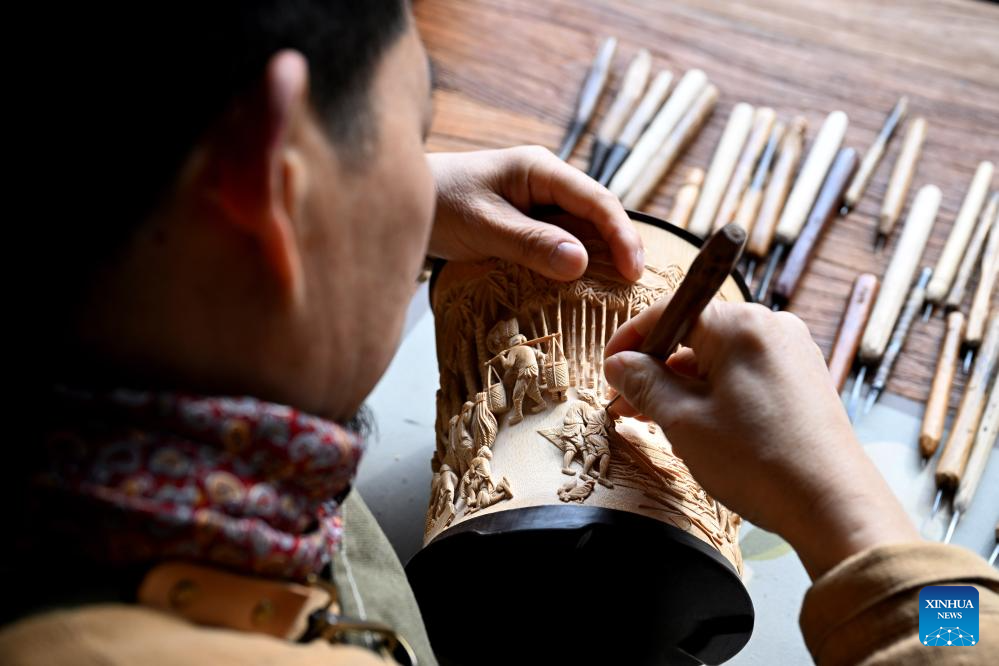
Hong Jianhua works on a bamboo carving at Huizhou Sculpture Museum in Huizhou District of Huangshan City, east China's Anhui Province, Jan. 7, 2025. Hong Jianhua, an inheritor of Huizhou bamboo carving listed in China's national intangible cultural heritages, has been dedicated to the craft since the age of 16. The art has received a new lease on life thanks to the efforts made by Hong to innovate technical methods, especially in high relief. To better pass on the craft, Hong launched a studio and a museum to make the beauty of this ancient Chinese art widely known among the public.
The skills of bamboo carving, brick carving, wood carving and stone carving are the top four traditional carving arts in Huizhou. Taking the phyllostachys edulis, which is abundant in Huizhou area, as the raw material, bamboo carvers use knives to carve historical allusions, landscapes and other patterns on the phyllostachys edulis. (Xinhua/Huang Bohan)
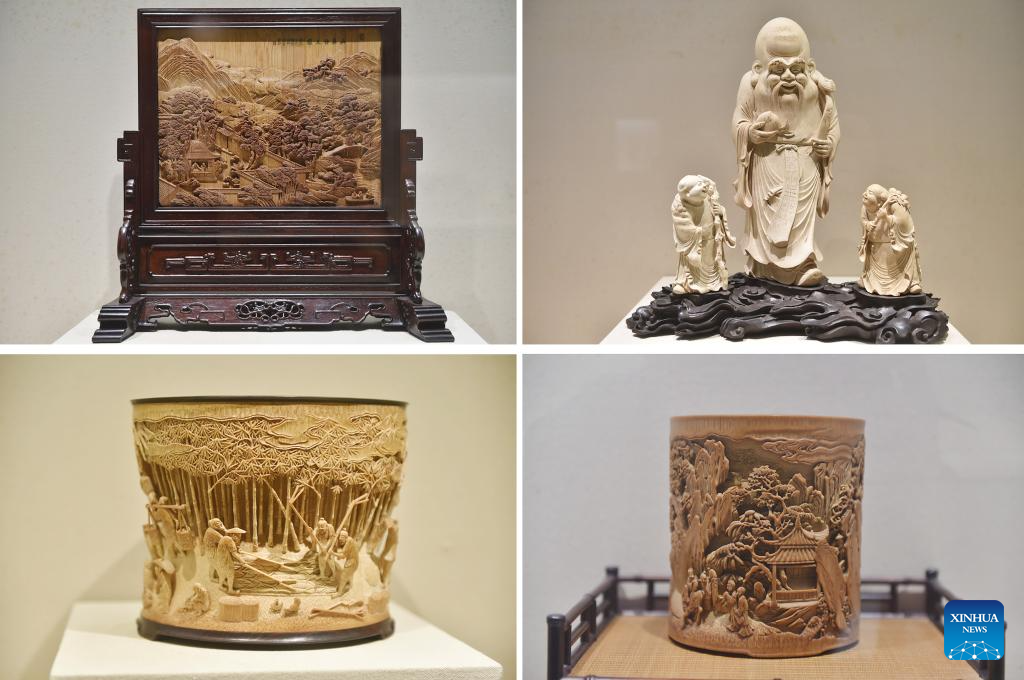
This combined photo taken on Jan. 7, 2025 shows bamboo carvings created by Hong Jianhua at Huizhou Sculpture Museum in Huizhou District of Huangshan City, east China's Anhui Province. Hong Jianhua, an inheritor of Huizhou bamboo carving listed in China's national intangible cultural heritages, has been dedicated to the craft since the age of 16. The art has received a new lease on life thanks to the efforts made by Hong to innovate technical methods, especially in high relief. To better pass on the craft, Hong launched a studio and a museum to make the beauty of this ancient Chinese art widely known among the public.
The skills of bamboo carving, brick carving, wood carving and stone carving are the top four traditional carving arts in Huizhou. Taking the phyllostachys edulis, which is abundant in Huizhou area, as the raw material, bamboo carvers use knives to carve historical allusions, landscapes and other patterns on the phyllostachys edulis. (Xinhua/Lu Peng)
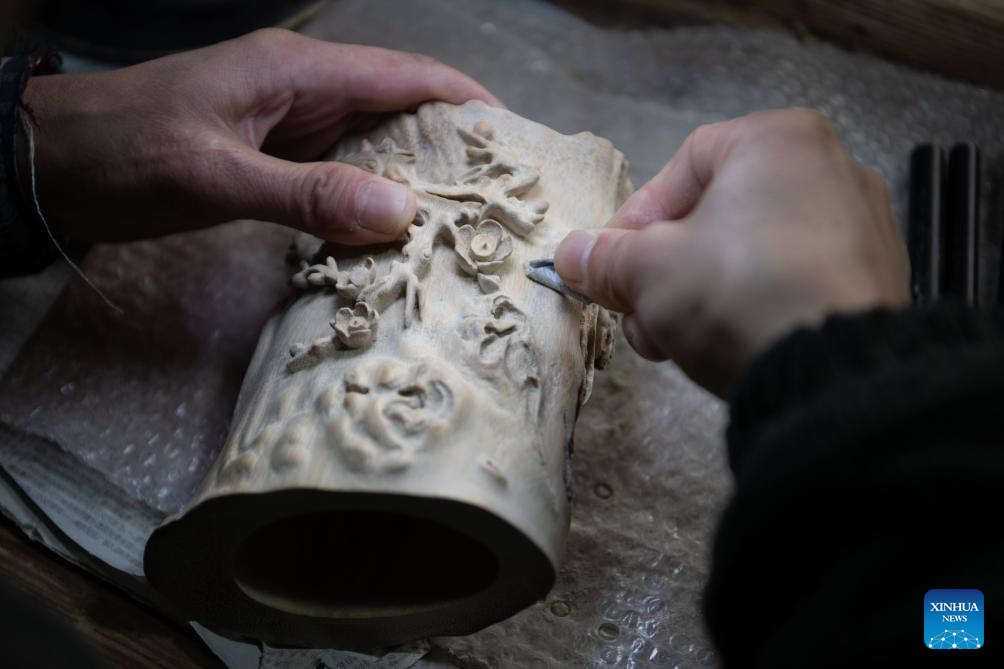
An apprentice of Hong Jianhua works on a bamboo carving at Huizhou Sculpture Museum in Huizhou District of Huangshan City, east China's Anhui Province, Jan. 7, 2025. Hong Jianhua, an inheritor of Huizhou bamboo carving listed in China's national intangible cultural heritages, has been dedicated to the craft since the age of 16. The art has received a new lease on life thanks to the efforts made by Hong to innovate technical methods, especially in high relief. To better pass on the craft, Hong launched a studio and a museum to make the beauty of this ancient Chinese art widely known among the public.
The skills of bamboo carving, brick carving, wood carving and stone carving are the top four traditional carving arts in Huizhou. Taking the phyllostachys edulis, which is abundant in Huizhou area, as the raw material, bamboo carvers use knives to carve historical allusions, landscapes and other patterns on the phyllostachys edulis. (Xinhua/Zhang Duan)
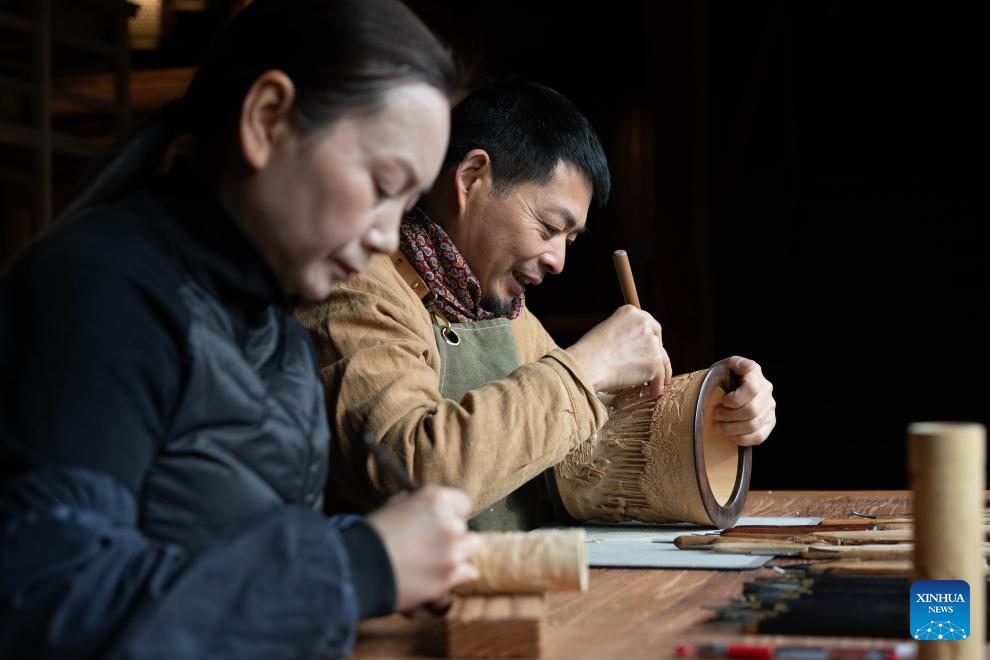
Hong Jianhua and his wife Zhang Hongyun work on bamboo carvings at Huizhou Sculpture Museum in Huizhou District of Huangshan City, east China's Anhui Province, Jan. 7, 2025. Hong Jianhua, an inheritor of Huizhou bamboo carving listed in China's national intangible cultural heritages, has been dedicated to the craft since the age of 16. The art has received a new lease on life thanks to the efforts made by Hong to innovate technical methods, especially in high relief. To better pass on the craft, Hong launched a studio and a museum to make the beauty of this ancient Chinese art widely known among the public.
The skills of bamboo carving, brick carving, wood carving and stone carving are the top four traditional carving arts in Huizhou. Taking the phyllostachys edulis, which is abundant in Huizhou area, as the raw material, bamboo carvers use knives to carve historical allusions, landscapes and other patterns on the phyllostachys edulis. (Xinhua/Zhang Duan)
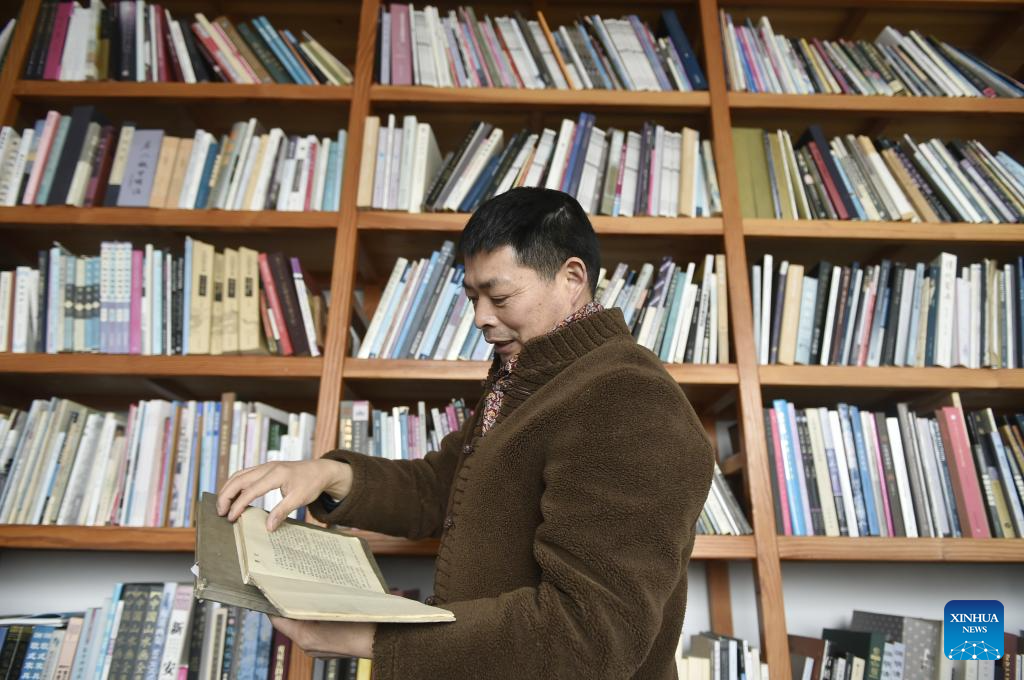
Hong Jianhua reads books on bamboo carvings at Huizhou Sculpture Museum in Huizhou District of Huangshan City, east China's Anhui Province, Jan. 7, 2025. Hong Jianhua, an inheritor of Huizhou bamboo carving listed in China's national intangible cultural heritages, has been dedicated to the craft since the age of 16. The art has received a new lease on life thanks to the efforts made by Hong to innovate technical methods, especially in high relief. To better pass on the craft, Hong launched a studio and a museum to make the beauty of this ancient Chinese art widely known among the public.
The skills of bamboo carving, brick carving, wood carving and stone carving are the top four traditional carving arts in Huizhou. Taking the phyllostachys edulis, which is abundant in Huizhou area, as the raw material, bamboo carvers use knives to carve historical allusions, landscapes and other patterns on the phyllostachys edulis. (Xinhua/Lu Peng)



